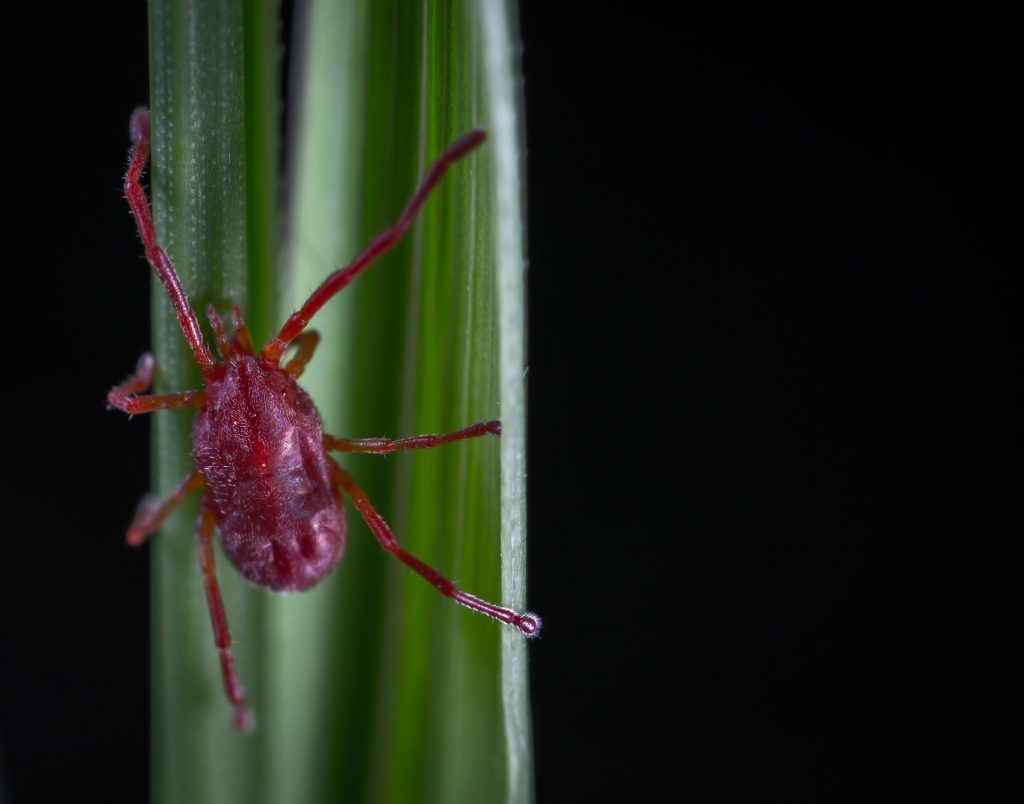If you have plants, chances are you’ve dealt with clover mites at some point. These tiny pests are a nuisance, and can cause damage to your plants if left unchecked.
The good news is that there are several things you can do to prevent clover mite damage to your plants. In this blog post, well share the best ways to keep these pests at bay.
So if you’re looking for ways to protect your plants from clover mites, read on!
What Are Clover Mites?
Clover mites are very tiny, red arachnids that are closely related to spiders. They are a nuisance because they often invade homes and buildings in large numbers. Clover mites do not bite or carry diseases, but they can be a nuisance because they leave behind red stains when crushed.
Clover mites are most active in the spring and fall, and they can live for several months without food. They typically enter homes and buildings through cracks and crevices in the foundation. Once inside, they will feed on plant materials, including leaves, flowers, and grasses.
Clover mites are difficult to control because they are so small and they reproduce quickly. If you have a clover mite infestation, you should contact a pest control professional for help. In the meantime, there are a few things you can do to reduce the number of clover mites in your home:
- Keep your home clean and free of clutter.
- Vacuum regularly, especially in areas where clover mites are often seen.
- Seal cracks and crevices in the foundation and around doors and windows.
- Remove any plants or vegetation that is close to the foundation of your home.
Clover mites are tiny red arachnids that are closely related to spiders. They are a nuisance because they often invade homes and buildings in large numbers. Clover mites do not bite or carry diseases, but they can be a nuisance because they leave behind red stains when crushed.
How Do Clover Mites Damage Plants?
Clover mites damage plants by feeding on their sap. This feeding can cause leaves to turn yellow or brown and eventually drop off. In severe cases, clover mite infestations can kill plants.
What Are Some Of The Best Ways To Prevent Clover Mite Damage To Plants?
There are a few things you can do to prevent clover mite damage to your plants. One is to keep your plants well-watered. Clover mites are attracted to dry plants, so watering your plants regularly can help keep them away.
Another thing you can do is to remove any dead leaves or debris from around your plants. This will also help keep the mites away. Finally, you can try using a pesticide specifically designed to kill clover mites. Be sure to follow the directions on the pesticide label carefully.
How Can You Remove Clover Mites From Your Plants?
If you have clover mites on your plants, there are a few things you can do to remove them. One option is to use a strong stream of water to blast them off of the plant. You can also try using a vacuum cleaner to suck them up. If these methods don’t work, you can try spraying the plant with an insecticide. Be sure to follow the directions on the insecticide label.
How Can You Keep Clover Mites From Coming Back?
If you have had a problem with clover mites in your garden in the past, there are some things you can do to prevent them from coming back.
- First, try to keep your garden free of debris and weeds. Clover mites like to hide in these places, so keeping your garden clean will make it less attractive to them.
- Second, water your plants regularly. Clover mites are attracted to dry, dusty conditions, so keeping your plants well-watered will help to keep them away.
- Third, apply a perimeter insecticide around your garden. This will create a barrier that will keep clover mites from getting in. Be sure to follow the directions on the insecticide label carefully.
- Fourth, if you have a lot of trees and shrubs in your garden, trim them back from the edge of your property. Clover mites like to live in these places, so keeping them trimmed back will help to keep them away from your garden.

By following these simple tips, you can help to prevent clover mites from becoming a problem in your garden.
What Should You Do If You Think Your Plants Have Been Damaged By Clover Mites?
If you think your plants have been damaged by clover mites, it is important to take action quickly. These pests can cause a lot of damage to your plants, and if left unchecked, they can quickly destroy your entire crop.
The first thing you need to do is to inspect your plants carefully. Look for small, red mites crawling on the leaves or stems. These mites are very small, so you may need to use a magnifying glass to get a good look at them. If you see any mites, it is important to remove them from your plants as quickly as possible.
There are a few different ways to remove clover mites from your plants. One way is to simply pick them off by hand. This can be a tedious process, but it is effective. Another way is to use a strong stream of water to blast them off of your plants. This method is also effective, but it can damage your plants if you are not careful.
Once you have removed the clover mites from your plants, you need to take steps to prevent them from coming back. One way to do this is to keep your plants well-watered. Clover mites prefer dry conditions, so by keeping your plants moist, you will make your garden less attractive to them. Another way to prevent clover mites from damaging your plants is to use a pesticide that is specifically designed to kill these pests.
Be sure to follow the directions on the pesticide label carefully to avoid harming your plants.
By taking quick action and using the proper control methods, you can prevent these insects from damaging your plants.
How Can You Prevent Clover Mite Damage In The Future?
If you have had clover mite damage in the past, you know how frustrating it can be. These tiny creatures can wreak havoc on your plants, and they’re difficult to get rid of once they’ve infested your garden.
Luckily, there are some things you can do to prevent clover mite damage in the future. By following these tips, you can keep your garden healthy and free of these pesky pests.
- One of the best ways to prevent from these insects is to keep your garden clean. These pests are attracted to places that are cluttered and overgrown. If you keep your garden tidy, it will be less appealing to these insects.
- Additionally, you should regularly remove any dead leaves or plant debris. This will help discourage the mites from setting up shop in your garden.
- It’s also important to choose the right plants for your garden. Some plants are more susceptible to damage from these insects than others. If you’re concerned about these pests, opt for plants that are known to be resistant to them.
- Additionally, you can try planting certain herbs and spices in your garden. Some of these, such as mint and garlic, can help deter these mites.
- You should be on the lookout for signs of an infestation. If you see small, red mites on your plants, it’s likely that you have an infestation and you notice damage to your plants, such as yellowing or wilting, this is also a sign that clover mites are present.
- If you see any of these signs, take action immediately. The sooner you treat an infestation, the easier it will be to get rid of the mites.
By following these tips, you can prevent the damage in your garden. Keeping your garden clean and tidy, choosing the right plants, and being on the lookout for signs of an infestation, you can keep these pests at bay.
Conclusion
There are a few things you can do to prevent clover mite damage to your plants:
- Keep your plants well-watered. Clover mites thrive in dry conditions, so keeping your plants hydrated will help to keep them away.
- Remove any dead leaves or debris from around your plants. This will help to eliminate potential hiding places for clover mites.
- Inspect your plants regularly for signs of any mites activity. If you see any, take action immediately to remove them before they have a chance to do any damage.
By following these simple tips, you can help to keep your plants away from these tiny insects and prevent them from causing any damage.
About the Author
Michelle Wilde is a stay-at-home mom and avid plant lover. Armed with a postgraduate degree in Computer Science (no kidding!), she loves researching plants and landscapes. When she is not caring for her 4 kids, she spends time on her passion for plants. She blogs at www.indoorplantschannel.com, the trusted source for indoor plants.








